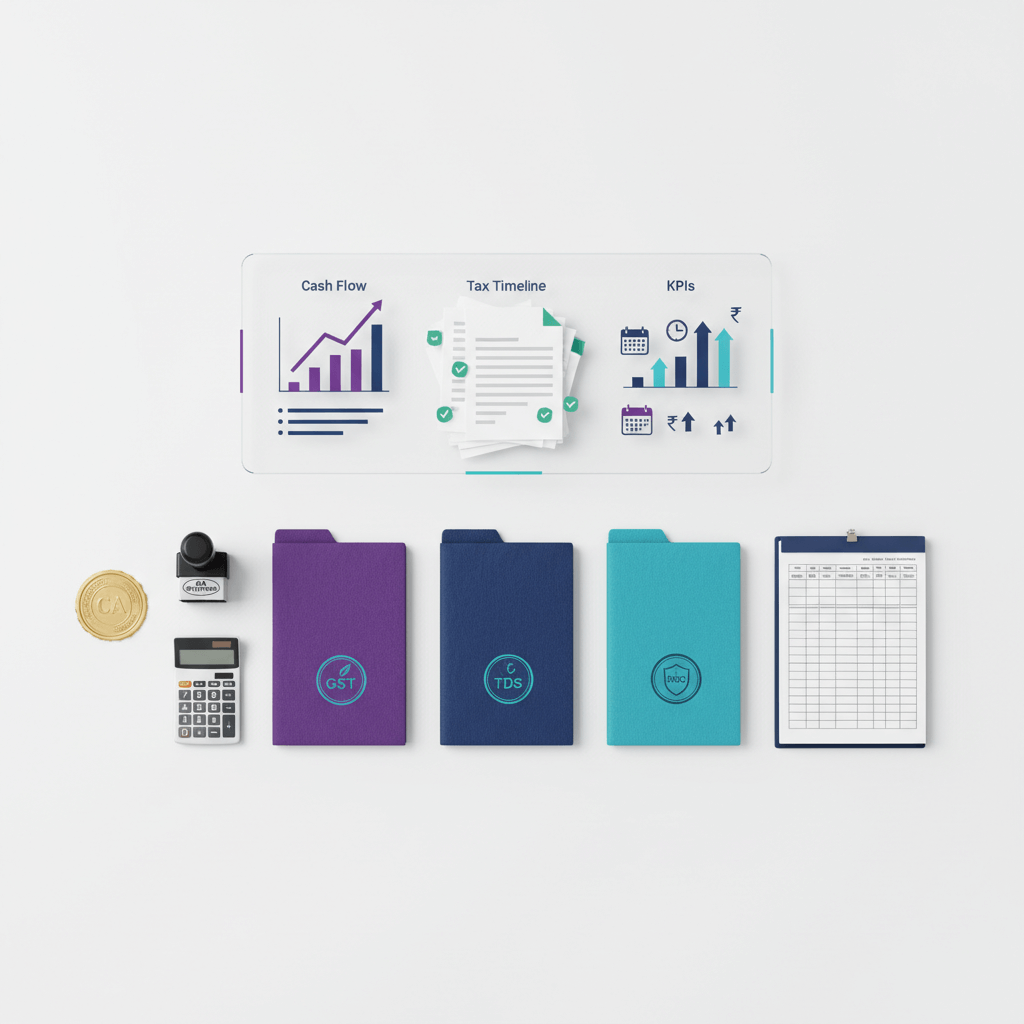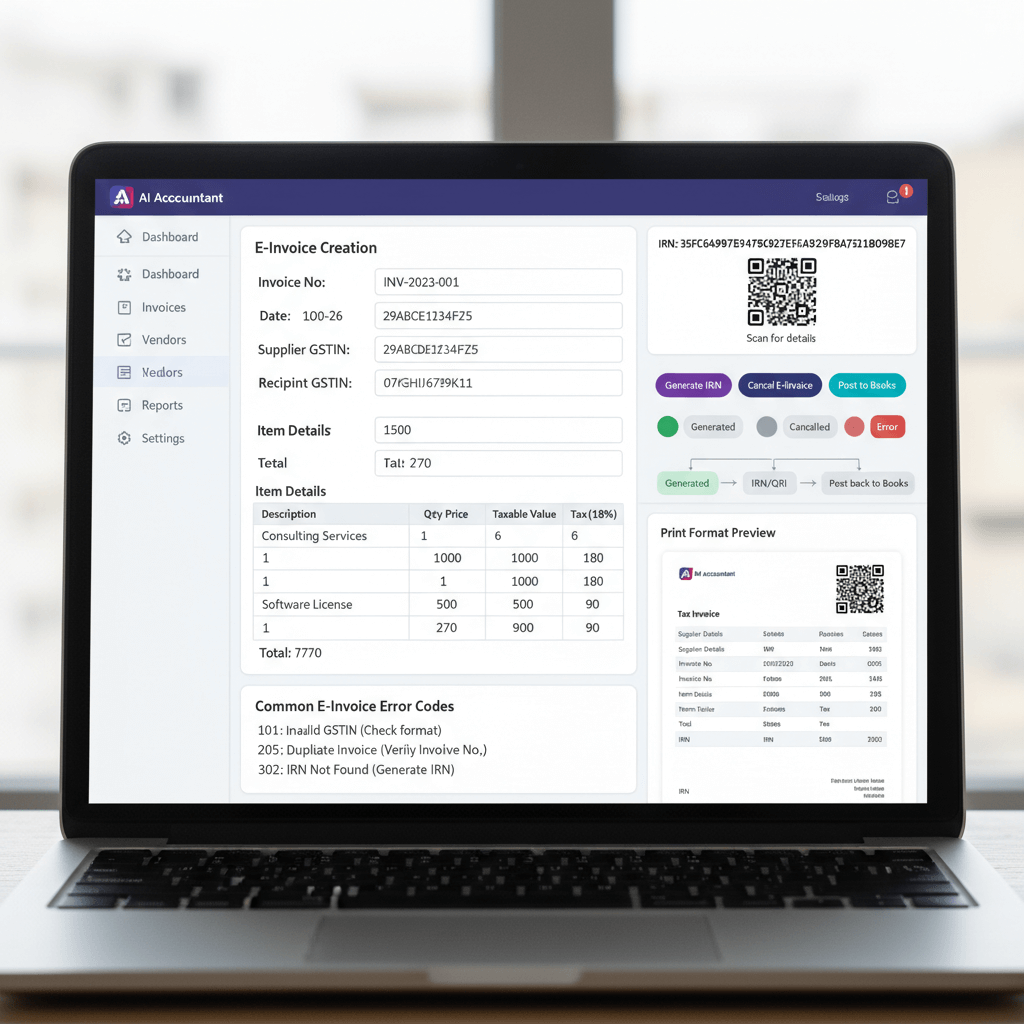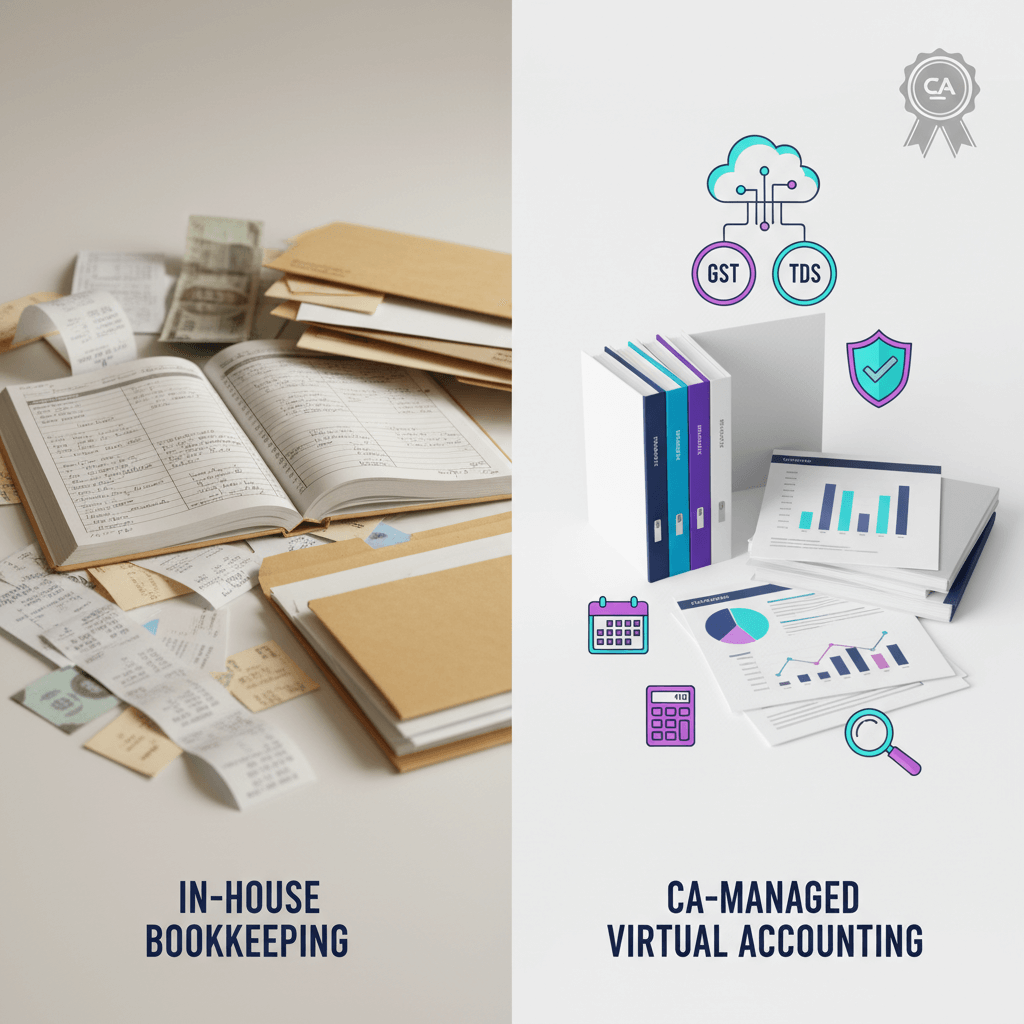Estimated reading time: 8 minutes
Key Takeaways
- AI accounting software automates tedious manual accounting tasks, freeing up time for business growth.
- It reduces costly human errors, ensuring accuracy and consistency in financial reports.
- Provides real-time financial insights for smarter decision-making.
- Strengthens fraud detection and maintains compliance with financial regulations.
Understanding AI Accounting Software: What Exactly Is It?
AI accounting software automates repetitive tasks in financial management, allowing your team to focus on what truly matters. These intelligent tools use artificial intelligence and machine learning to:
- Enter financial data accurately
- Generate reports instantly
- Perform reconciliations automatically
- Keep company finances compliant and organized
AI accounting tools go well beyond traditional accounting software. They learn from the transactions you enter, identifying patterns and predicting future outcomes like cash flow or expenses.
Core AI technologies found in accounting solutions include:
- Intelligent Document Processing (IDP) – IDP technology processes digital and physical documents like invoices or receipts through Optical Character Recognition (OCR) and Natural Language Processing (NLP), taking data entry tasks off your hands. Source
- Machine Learning – AI software becomes more accurate over time as it continuously learns from data patterns and user inputs to better handle future tasks.
- Predictive Analytics – Advanced forecasting tools help businesses anticipate future financial conditions and strategically plan for growth and changes. Source
By incorporating these core technologies, AI accounting software significantly upgrades financial management practices.
Benefits of Accounting Automation Software for Small Businesses
Accounting automation software offers incredible advantages specifically for small businesses, including:
- Time and Resource Savings: AI-powered tools significantly reduce time spent on manual entry and reconciliation tasks, freeing staff to focus on strategic work. Source
- Reduced Errors: Automated data entry minimizes human mistakes, ensuring accuracy and consistency in financial reports. Source
- Real-time Financial Insights: Instant updates on key financial data empower faster, smarter decisions based on up-to-date information. Source
- Enhanced Fraud Detection: AI analyzes transactions continuously and can quickly identify irregularities, protecting your business from financial fraud or suspicious activities. Source
- Improved Compliance: AI maintains audit-ready reports and automatically tracks compliance with financial regulations, reducing risk and ensuring accuracy across international standards. Source
Exploring AI Bookkeeping Automation: How Does It Work?
Bookkeeping automation solutions simplify and streamline accounting processes in several practical ways:
- Invoice Processing: AI quickly scans, extracts, and enters vendor information, amounts, and payment dates from invoices, eliminating manual entry tasks. Source
Related: Accounts Payable Automation in India, A Complete AI Guide - Receipt Management: Captures and organizes receipt information digitally for easier expense management and clear audits.
- Bank Reconciliation: Automatically matches transactions from your accounting records with bank statements, highlighting discrepancies needing attention.
Related: AI Reconciliation is Fixing the Biggest Headache in Indian Accounting - Tax Preparation: Categorizes expenses automatically based on tax rules, preparing your business for speedy, accurate tax filings every time.
Top Automated Bookkeeping Tools
Today’s market offers numerous AI tools and platforms that ease bookkeeping. When choosing the right tool, look for solutions that boost accuracy, insights, scalability, and efficiency.
Top accounting automation tools to consider include:
- AI Accountant (https://aiaccountant.com) – Our cutting-edge solution designed to automate accounting tasks, reduce manual bookkeeping work substantially, enhance accuracy, and improve decision-making capabilities.
- V7 Go: Intelligent platform for document processing that helps extract key details from financial documents.
- ABBYY FlexiCapture: Automated data extraction and processing for invoices and receipts.
- Hyperscience: Accurate document recognition and data validation powered by machine learning.
- Kofax: Intelligent automation transforming complex accounting workflows.
Make sure whatever AI bookkeeping software you choose integrates smoothly with your existing financial systems.
Implementation Tips for AI Accounting Software
Successful integration of AI accounting software requires thoughtful planning:
- Integration Strategy: Clearly decide how the solution will fit within your current ERP, CRM, or banking platforms.
- Data Migration: Safely move historical financial data to your new software to ensure seamless continuity and accurate AI-driven insights.
- Training: Equip your team with proper training resources so they effectively use the new tools, maximizing your return on investment and team acceptance. Source
Related: AI Accountant vs. Human Accountant: What’s the Future? - Human-in-the-Loop Review: Initially, have your team spot-check AI results to ensure accuracy as the system learns your specific accounting needs. Source
Commercial Considerations for AI Accounting Software
When evaluating and deciding on an AI tool, consider these crucial factors:
- ROI Analysis: Weigh immediate savings in time and resources against long-term strategic advantages gained.
- Scalability: Confirm the solution can accommodate your growing business and continually evolving financial processes.
- Vendor Evaluation: Beyond technology alone, evaluate vendor support, training materials, and update frequency to maximize software value over time.
Future Trends in AI-Driven Bookkeeping
Looking forward, AI will reshape accounting careers and financial departments dramatically:
- Shifting Professional Focus: With AI managing routine tasks, accountants will increasingly take on analytical and strategic advisory roles, demanding new skills such as emotional intelligence and strategic thinking. Source
- Advanced Predictive Capabilities: Future AI accounting tools will offer even more advanced forecasting and scenario planning abilities, enabling enterprises to plan smarter financial strategies.
- Career Evolution: Accountants embracing AI-driven tools today will gain opportunities for growth, making themselves indispensable strategic advisors within their organizations. Source
Conclusion: Why Adopt AI Accounting Software Now?
AI accounting software presents tremendous opportunity for transforming your financial operations. It handles the mundane tasks, dramatically improves accuracy, offers instant financial insight, enhances compliance, and helps preview future financial conditions.
Businesses adopting AI accounting software in 2025 will easily outperform competitors that cling to outdated manual methods. Choose automation tools carefully with clear attention to integration, training, scalability, and vendor quality to ensure long-lasting benefits and competitive advantage.
Start your shift toward smarter, automated financial management today. There’s no better way to future-proof your small business and empower your accounting team to focus strategically on growth, not just managing numbers.
Ready to experience the future of automated bookkeeping firsthand? Try AI Accountant today at https://aiaccountant.com.
FAQ
1. How does AI bookkeeping work?
AI bookkeeping automates repetitive accounting tasks by using artificial intelligence and machine learning algorithms. It processes financial data, recognizes patterns, and performs tasks like data entry, invoice processing, and reconciliation automatically, reducing manual effort and minimizing errors.
2. Can AI accounting software replace my accountant?
AI accounting software is designed to assist accountants, not replace them. It automates routine tasks, allowing accountants to focus on strategic planning, analysis, and providing valuable insights to support business growth.
3. What are the best AI accounting tools available?
Some of the top AI accounting tools include AI Accountant, V7 Go, ABBYY FlexiCapture, Hyperscience, and Kofax. These tools offer various features like intelligent document processing, automated data extraction, and advanced analytics.
4. Is AI accounting software secure?
Yes, reputable AI accounting software incorporates robust security measures to protect your financial data. They use encryption, secure data centers, and comply with industry regulations to ensure data privacy and security.
5. How much does AI accounting software cost?
The cost of AI accounting software varies depending on the provider, features, and scalability. Many vendors offer flexible pricing models, including subscriptions or usage-based fees. It’s essential to consider the return on investment when evaluating the cost.
6. Do I need technical skills to implement AI accounting software?
No extensive technical skills are required. Most AI accounting solutions are designed with user-friendly interfaces and provide training resources. The vendor often assists with implementation, integration, and support.
7. How does AI help in fraud detection in accounting?
AI continuously analyzes financial transactions and detects unusual patterns or anomalies that may indicate fraudulent activities. It provides real-time alerts and helps in preventing and mitigating fraud risks.
8. Can AI accounting software help with tax preparation?
Yes, AI accounting software can automate tax preparation by categorizing expenses based on tax rules, ensuring compliance, and generating accurate tax reports. This streamlines the tax filing process and reduces the risk of errors.
9. What are the future trends in AI accounting?
Future trends include advanced predictive analytics, greater automation of complex tasks, and the evolution of accountants’ roles into strategic advisors. AI will continue to enhance efficiency and provide deeper financial insights.
10. How can I integrate AI accounting software with my existing systems?
Most AI accounting software offers integration capabilities with common ERP, CRM, and banking platforms. It’s crucial to plan your integration strategy and work with the vendor to ensure seamless connectivity with your existing systems.
-01%201.svg)





